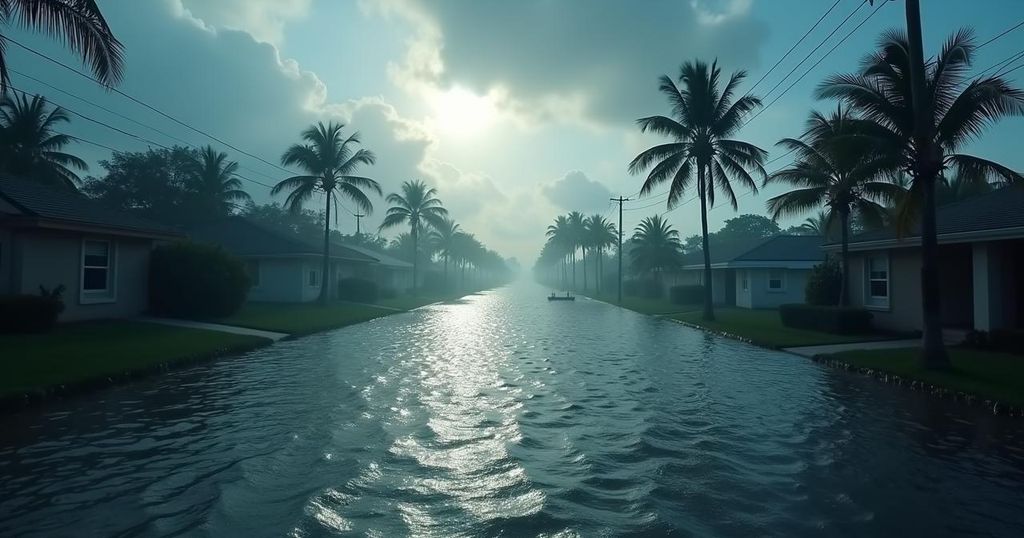Hurricane Helene Causes Widespread Devastation and Rising Death Toll in Southeastern U.S.

Hurricane Helene has devastated the Southeastern U.S., resulting in at least 69 fatalities and overwhelming damage. States are engaged in recovery efforts as damage estimates soar, with South Carolina bearing the brunt of casualties. Florida also reports significant loss of life and extensive property destruction. The storm’s impact on infrastructure has left millions without power, highlighting the critical need for disaster preparedness and response.
The United States is grappling with the aftermath of Hurricane Helene, which unleashed fierce winds and torrential rain across the Southeastern region, causing extensive flood damage and leaving millions without power. As states embark on extensive cleanup and recovery efforts, the hurricane’s death toll has tragically risen to at least 69 individuals, and officials are apprehensive that this figure may increase as search and recovery operations continue in several affected states, including South Carolina, Florida, Georgia, North Carolina, and Virginia. The extensive damage from Hurricane Helene has resulted in estimates ranging from $15 billion to over $100 billion in losses, as emergency responders assess the extent of the destruction. South Carolina has reported the highest number of casualties, with 25 fatalities attributed largely to falling trees. Governor Henry McMaster remarked, “It is a devastating blow, but we can make it through. Help is on the way, but it is going to take time.” In North Carolina, the situation remains dire, with a reported death toll of 11, and officials indicating that many roads in the western part of the state will require months of work before they can be reopened. Meanwhile, in Flat Rock, North Carolina, residents face severe inconveniences due to widespread blackouts and long lines at gas stations. One resident expressed their frustrations, stating, “You are not going to be able to go nowhere, and it is just a scary feeling.” The Federal Emergency Management Agency (FEMA) reported significant damage to water systems, communication networks, and vital transportation routes in the region. In total, approximately 2.7 million customers were reported without power; although this number has decreased by 40% since Friday. Florida has borne witness to significant devastation, with Governor Ron DeSantis reporting 11 fatalities linked to storm surges that reached unprecedented heights. Survivor narratives from Horseshoe Beach highlight the emotional toll the disaster has taken on residents who have lost homes that stood for generations. James Ellenburg recounted, “I took my first step right here in this yard.” Further north, in western North Carolina, nearly 30 inches of rainfall have inundated areas, leaving infrastructure decimated and residents struggling for basic necessities. Local officials are carefully monitoring dam stability as concerns about potential failures loom. Governor Brian Kemp of Georgia confirmed that 17 lives have been lost in his state due to the storm’s impacts. President Joe Biden, who has declared a major disaster in Florida, articulated his condolences by stating, “It is tragic. You saw the photographs. It is stunning.”, emphasizing the immense damage inflicted by Hurricane Helene.
Hurricane Helene represents a significant natural disaster that has affected various Southeastern states in the U.S., leading to widespread destruction and loss of life. The storm’s combination of wind, rain, and storm surges has resulted in catastrophic flooding, contributing to an escalating death toll and necessitating extensive recovery efforts. With damage assessments continuing, the financial impact of the hurricane on property and the economy is projected to be substantial. This disaster serves as a reminder of the vulnerabilities faced by coastal and inland communities during severe weather events, along with the critical need for disaster preparedness and timely response measures.
In conclusion, Hurricane Helene has caused extensive destruction across multiple states, leading to significant loss of life and devastating economic repercussions. The responses from state leaders and emergency services demonstrate a commitment to recovery; however, the road ahead will be long and arduous. With extensive damage to infrastructure and ongoing assessments to address community needs, the focus will shift towards rebuilding and preparing for future disasters. This event underscores the vital importance of resilience and preparedness in the face of natural calamities.
Original Source: www.cnbc.com







